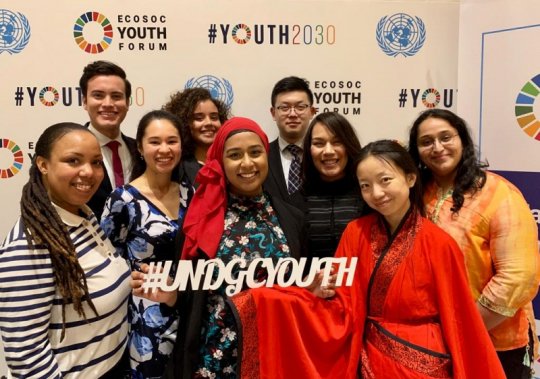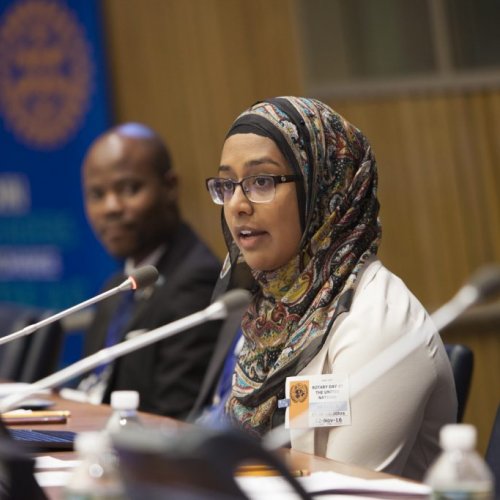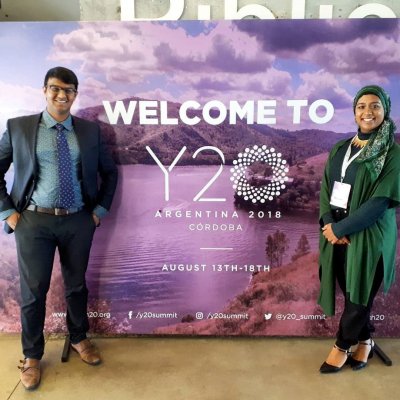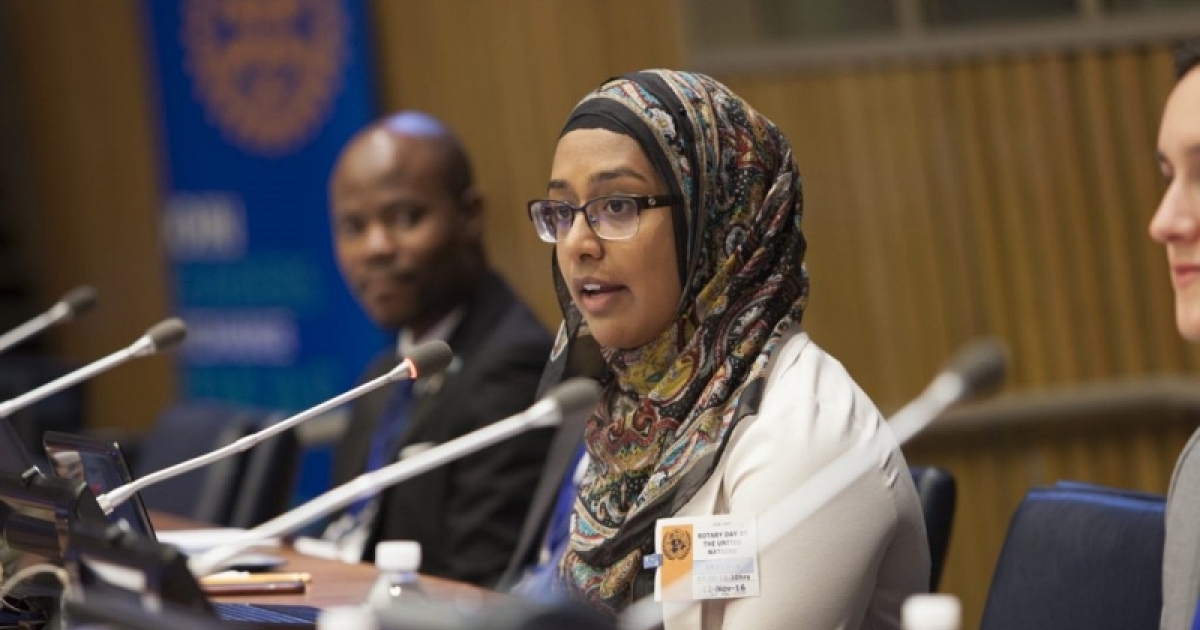“My Mentor Helped Me Reflect on How Best to Define Success”
Aniqah Zowmi has a passion for youth engagement at all levels of government and civic organization. She is currently a Member of the Youth Advisory Group to the Canadian Commission for UNESCO (CCUNESCO). Aniqah is pursuing a Master of Arts in Social Justice and Equity Studies at Brock University. She hopes to create a future that will allow her to leverage the voices of young people to build communities and co-create solutions to the United Nations Sustainable Development Goals.
Q: Tell us a few things about your country, and also your life's story!
A: I grew up in a post-9/11 world. Being a young, Muslim woman in a world of Islamophobia, coupled with being the daughter of immigrants to Canada, presented a struggle for the formative years of my life. This, in addition to the media sensationalism that portrayed Muslims in a negative light, contributed to my altered perception of the world.
I found myself to be in the midst of an identity crisis: how could the world be telling me I am one thing - unequal due to my race, unjust due to my religion - but my internal compass telling me I was not? I was put in a position to not allow myself to be subjected to what society or the media defined me.
It was through this perspective that I discovered a love of social justice and equity-seeking. I am currently working to engage marginalized populations - including minorities and women - in developing the future of their communities, governments, and lived realities. I have recently been working in the sphere of youth engagement, advocating for the representation of young people at the highest levels of government and civic organizations.
Understanding that youth with specific identities (e.g. those who are Indigenous, women, visible minorities, identify as LGBTQ+, etc.) are often marginalized in developing the policies, procedures, and initiatives that directly affect them, I have advocated for these populations to be meaningfully included in developing these policies, procedures, and initiatives. I currently serve as a member of the Youth Advisory Group to the Canadian Commission for UNESCO and as a Youth Representative to the UN Department of Global Communication's Youth Representatives Steering Committee. In these roles, among others, I advocate for the representation of marginalized populations in achieving these organizations' mandates.
Q: What is your view of the world as it is today? And how do you define the concept of a better world?
A: My aunt tells me that the most dangerous word when I was little was the word ‘no’. If you said ‘no’ to me, in a few minutes you would find me doing exactly what you had just told me not to, or attempting what I believed to be impossible. I am the type of person that would try to make one trip to my house with the groceries, even when I know it is physically impossible. While endearing (if a little embarrassing), I find that this quality has followed me throughout my life and continues to be a defining feature of who I am today.
I hate the word ‘no’ and the notion of ‘impossible’ and have always used these words to propel me to prove to the world that nothing is impossible. Relentlessly questioning (often to my family’s dismay), I’ve grown up challenging the preconceived notions that we, as a society, hold about the state of the world – yes, this is how things are currently done, but what if they weren’t? This resistance to the status quo has fundamentally changed my perspective of the world; I leverage this belief to advocate for a world that meaningfully engages and represents all populations, not just ones with financial and political power.
My vision for a better world is one that allows all individuals the chance to achieve their self-defined version of 'success', without the additional barriers that being from vulnerable populations or having an underrepresented identity may impose. Through this determination to 'resist', I work to advocate for diverse representation and initiatives and policies that allow multiple individuals to seek equity.
A good example of this is the disproportionate representation of women at the highest levels of business and government; despite women making up nearly 50% of the world's population and workforce, women make up less than 50% of boards, leadership, and governmental bodies. While some might push back on this statistic, stating that women may opt-out of these leadership roles, I would resist this claim. In most societies, women are socially conditioned to perform social and reproductive labour (such as raising children, keeping a home) which impacts career progression. As a result, due to social expectations and the imposition of gender roles, women face additional barriers to reach the highest levels of government and civic organizations as compared to men. When women are underrepresented in these spaces, the policies and procedures created by institutions is not reflective of the diversity of the population it affected, and often reinforces the barriers that prevent these marginalized populations from achieving representation.
As a Muslim woman of colour, I have been working in recent years to understand the ways in which systems, laws, policies, and organizations can be fundamentally shifted to embrace equity-seeking ideals that meaningfully engage people of various backgrounds and lived experiences.
Q: As a young individual what are a few of the hurdles that you had to overcome up until today?
A: As I have mentioned previously, being a woman and a minority has been a challenge, particularly when I am present in spaces where I am visibly unique. For example, when I was in my final year of my Bachelor's degree, I sat on my university's Human Rights Task Force. This Task Force was developed to review and revise human rights policies, ideally to engage the voices of populations such as students that have historically been underrepresented at the institutional level.
As a visible Muslim woman, however, I received criticism for being present on the Task Force - general feedback from the university community resulted in one individual being upset that there was Muslim representation on the Task Force, but no Christian/Jewish/other denominational representation. While there was representation of other belief systems (though without a specific identifier such as a hijab, as I wear, this representation can be considered relatively 'invisible'), the reality was that my role on the Task Force was not to advocate for religious input - it was to advocate for the perspectives and rights of undergraduate students. While my religious identity may have influenced my identity and passion for equity ideals, it did not impact my role on the Task Force - and as such, could not be a valid critique of the Task Force's members.
It is worth mentioning, however, that this form of criticism regarding religious representation was not lauded at any other member of the Task Force, despite the membership being largely Christian/Catholic. This was an attempt to invalidate my position on the Task Force, and shape the narrative to be one of Islam vs. the institutional system, not one in which I, a student, was advocating for the rights and views of students to be represented during an institutional reform. As a result, these systemic barriers and invalidation of my work by virtue of my identity has been a challenge. It is doubly challenging when some of these barriers are 'invisible' - for example, many forms of racism, while obvious to the victim, can be difficult to prove.
How can a student dealing with a professor that marks their work more harshly than their peers because of the student's identity challenge the professor, particularly when the professor has relative authority to the student, and when objective proof is difficult to find? It would be an oversight, however, to neglect to acknowledge the privilege that I do have. As a woman with education, who has access into spaces that many do not, with a citizenship of a 'First World' country that enjoys the status and benefits associated with that citizenship - I hold a lot of privilege. Yet, understanding that those who do not have these opportunities are doubly marginalized due to racism, sexism, etc. and a relative lack of privilege makes it incumbent upon me to leverage the privilege that I do have to make space for others to become advocates for themselves.

Q: Why is the role of a mentor important for you?
A: My mentor has been an invaluable sounding board as I navigate through this phase of transition in my life. I am currently moving out of my Master's and into the workforce, and as I look towards the first year of my life out of school since I was 4, I can feel the pressure mounting. It is easy to get wrapped up in the concept of mapping out a future year-by-year based on milestones, but I began to feel like I was not achieving 'success' because I didn't get x job in y country. When speaking to Katie (Dr. Bolzendahl), she helped me reflect on how best to define 'success'.
Katie prompted me to look at my next five years through a 'growth' mindset, and not through a 'fixed' mindset. By embracing growth in specific areas as my definition of 'success', and intentionally choosing to put myself in roles and seek out opportunities to grow personally and professionally, I am able to develop a five-year plan that allows me to learn and meaningfully reflect, rather than simply achieve a checklist of jobs and roles.
This has been a fundamental shift in my mindset, and has allowed me to be more open to new opportunities that may not necessarily align with what I had previously believed was my life plan - but gives me the space and opportunity to learn, grow, and develop.
Q: Name a project, a foundation or a person in your country that you think is doing great work in helping improve other people's lives!
A: Jennifer Correiro of the organization TakingITGlobal! She has been a mentor and inspiration in my own life, and help guide me towards my own career progression in the humanitarian/youth advocacy field. She works to engage young people in social initiatives to address societal problems relating to the planet, people, and profit (the triple bottom line).
Q: Athena40 is the first ever global selection of the top 40 women forward thinkers, commentators, activists, authors, academics, entrepreneurs, executives, innovators. Can you think of a truly innovative and forward-thinking woman from your country that you wish to nominate for the Athena40 global list?
A: Jennifer Corriero of the organization TakingITGlobal: jenergy@takingitglobal.org.
Q: Share with us a phrase, a poem or a story that you love or you find interesting!
A: This quote was shared with me at a very difficult time of my life, when I was trying to figure out how best to move forward personally and professionally. This excerpt from the TV show 'How I Met Your Mother' has been a quote that grounds me:
"I feel so lost right now. I don't even know what I'm doing with my life."
"Can I tell you an embarrassing story? I felt lost for a long time, too. I was living in my parents' basement. Playing video games, mastering those games, until I finally woke up and realized I wanted to follow my dream of teaching music. Let me save you a few years. Even if it sounds completely crazy what is it you want to do with your life?"
"I want to end poverty."
"Great. Then every decision you make from here on out should be in service of that."




